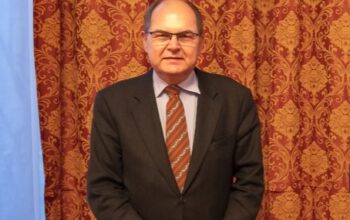The “Bonn Powers,” under which the High Representative in BiH claims the authority to rule and punish by decree, have always been founded not in law but in the support or acquiescence of key members of the international community. That foundation is cracking.
The international community, at last, is coming to understand the need to end the Bonn Powers and put BiH’s future in the hands of its citizens and elected leadership. The High Representative’s dwindling support among important members of the international community was evident at last month’s UN Security Council meeting on BiH.
German Ambassador Peter Wittig made clear Germany’s view that the High Representative impedes reform and that his regime as we know it must come to an end. He criticized the international community’s continued “close monitoring” and “far-reaching supervision” of BiH, explaining:
[T]hat approach has not succeeded in creating incentives for local politicians to choose the route of compromise over advancing their nationalist agendas. In fact, the international community’s approach at times serves as an impediment to political leaders’ accountability to their electorates and to their assumption of ownership of the reform process.
We should not continue that way. Our focus should be on employing instruments that are better suited to initiate positive developments. Obsolete approaches should be discontinued.
Ambassador Wittig continued:
Decoupling the High Representative and the EU Special Representative and endowing the latter with a sound mandate was an important step. Further steps must follow. The European Union and Bosnia and Herzegovina’s EU perspective should become the only game in town. That will include the continued reconfiguration of EUFOR and Operation Althea. In addition, we are of the view that the Office of the High Representative should be downsized and relocated abroad. Its staff levels should be commensurate with its remaining tasks. (emphasis added)
The European Union’s statement at the Security Council meeting—with which France, Portugal, and Croatia associated themselves—also recognized the need to end the OHR status quo. The EU, the statement said, “looks forward to the discussions with the international community on the reconfiguration of the international presence, including its downsizing and the possible relocation of the Office of the High Representative in the appropriate forum.”
Russia’s criticisms of the current OHR regime were more explicit. Ambassador Vitaly Churkin called for the “transfer of responsibility for the future of the country to Bosnians themselves,” including by “abolishing the Office of the High Representative.”
As Serbia’s representative at the Security Council meeting said, “Only the institutions of Bosnia and Herzegovina and the citizens of that country can define its policy, and there are no powers on the basis of which these functions could be taken over by international presences.” He added, “Serbia is of the opinion that the process of closing the Office of the High Representative and of cancelling the so-called Bonn powers should be embarked upon because the legitimately elected representatives of all peoples and entities have the ability and capacity to assume responsibility for the independent conduct of the affairs of State and the initiation of reform processes.”
If the Bonn Powers had any foundation in the Dayton Accords or other sources of law, their loss of support in the international community would not necessarily threaten them. The fact, however, is that the international community’s support and acquiescence has always been the only basis for the Bonn Powers’ existence. Without it, they will not stand for long.


